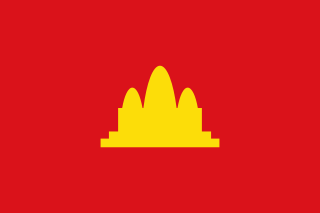
The Khmer Rouge was the name popularly given to the followers of the Communist Party of Kampuchea (CPK) and by extension to the regime through which the CPK ruled in Cambodia between 1975 and 1979. The name had originally been used in the 1950s by Norodom Sihanouk as a blanket term for the Cambodian left.

Pol Pot was a Cambodian politician who led Cambodia as the Prime Minister of Democratic Kampuchea between 1976 and 1979. Ideologically a Marxist–Leninist and Khmer nationalist, he was a leading member of Cambodia's communist movement, the Khmer Rouge, from 1963 until 1997 and served as the General Secretary of the Communist Party of Kampuchea from 1963 to 1981.
A one-party state, single-party state, one-party system, or single-party system is a type of state in which one political party has the right to form the government, usually based on the existing constitution. All other parties are either outlawed or allowed to take only a limited and controlled participation in elections. Sometimes the term de facto one-party state is used to describe a dominant-party system that, unlike the one-party state, allows democratic multiparty elections, but the existing practices or balance of political power effectively prevent the opposition from winning the elections.

The Kingdom of Cambodia, also known as the First Kingdom of Cambodia and the Sangkum Reastr Niyum regime, referred to Norodom Sihanouk's first administration of Cambodia from 1953 to 1970, an especially significant time in the country's history. Sihanouk continues to be one of the most controversial figures in Southeast Asia's turbulent and often tragic postwar history.
James Gordon "Bo" Gritz is a former United States Army Special Forces officer who served for 22 years, including in the Vietnam War. His activities in retirement, notably attempted POW rescues in conjunction with the Vietnam War POW/MIA issue, have been controversial.
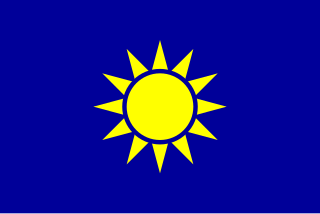
The People's Action Party of Vietnam (PAP),, is a Vietnamese exile anti-communist organization that is based in the United States. The organization is led by Chairman Nguyen Si Binh and Vice Chairman Dr. Nguyen Xuan Ngai.

The Patriotic Union or UP is a leftist Colombian political party. It was founded by the FARC and the Colombian Communist Party in 1985, as part of the peace negotiations that the guerrillas held with the Conservative Belisario Betancur administration. The party was subject to political violence from drug lords, paramilitaries and security forces agents during the mid-1980s, leading to its eventual decline, virtual disappearance and extermination.

The Cambodian–Vietnamese War, known in Vietnam as the Counter-offensive on the Southwestern border, was an armed conflict between the Socialist Republic of Vietnam and Democratic Kampuchea. The war began with isolated clashes along the land and maritime boundaries of Vietnam and Kampuchea between 1975 and 1978, occasionally involving division-sized military formations. On 25 December 1978, Vietnam launched a full-scale invasion of Kampuchea and subsequently occupied the country and removed the government of the Communist Party of Kampuchea from power.

The People's Republic of Kampuchea was founded in Cambodia by the Salvation Front, a group of Cambodian communists dissatisfied with the Khmer Rouge after the overthrow of Democratic Kampuchea, Pol Pot's government. Brought about by an invasion from the Socialist Republic of Vietnam, which routed the Khmer Rouge armies, it had Vietnam and the Soviet Union as its main allies.
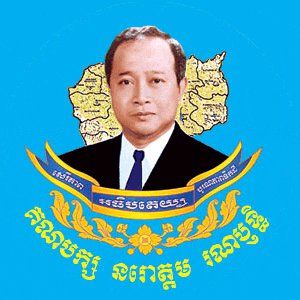
The Norodom Ranariddh Party is a Cambodian political party created by Prince Norodom Ranariddh, who has left the Royalist FUNCINPEC party of which he was previously leader/chairman.
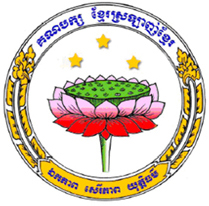
Khmer Loves Khmer is a Cambodian Political Party founded in 2008. It believes in democracy and ideas like in its slogan "Unity, Liberty and Justice". Therefore, its political position has broadened and represents many ideologies like some of the liberal oriented ideology since it believes in not big but smaller government can create “Significant changes and results can be obtained through smaller government”, helping to create changes and results from all the individuals that make up Cambodian society. The idea of people also having the "freedom of choice" in their lives means they can choose anything like food, healthcare, politics etc. which is a value of the KLKP's liberal ideology.
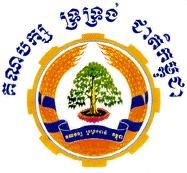
The Cambodian National Sustaining Party was created by its president Pen Sovan. Formed on 21 January 1998, and holding its first party congress on the same day.

On 20 December 2008 nine days before the candidate registration deadline ended the DSP was created by its leader president Thorng Sovannara, who says it was a breakaway faction of the Khmer National Party that he changed into a political party.
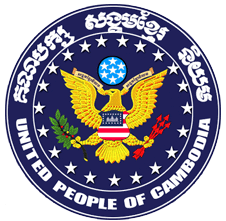
The United People of Cambodia was a political party created by its leader president, Sarath Oeurn, in August 2003. Oeurn lives in America and only visits Cambodia and his party once a year in July. At the moment it is not led by Oeurn but its acting party president Tit Thang.
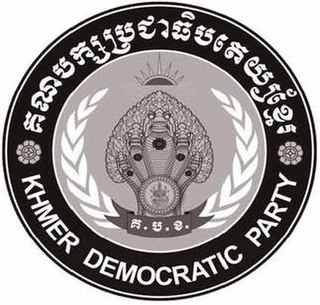
The Khmer Democratic Party (KDP) is a Cambodian third political party
In Cambodia, drugs are readily available, thus, easy to access, including illegal substances.

North Vietnam, officially the Democratic Republic of Vietnam (DRV), was a country in Southeast Asia from 1945 to 1976.

The Congress of the New Right is an economically libertarian, socially conservative and Eurosceptic political party in Poland. The party was founded on 25 March 2011 by Janusz Korwin-Mikke, from the merger of the Liberty and Lawfulness (WiP) with several members of the Real Politics Union (UPR). The former leader Korwin-Mikke was ousted from the party in 2015. The party assumed the official name Congress of the New Right on 12 May 2011.
Classicide is the deliberate and systematic destruction, in whole or in part, of a social class through persecution and violence. The term "classicide" was termed by sociologist Michael Mann as a term that is similar but distinct from the term genocide. Examples includes Joseph Stalin's mass killing of the affluent middle-class peasant Kulaks who were identified as "class enemies" by the Soviet Union. Similar classicide has been committed by China during the Great Leap Forward, by North Vietnam as part of the Land Reform, and by the Khmer Rouge regime in Cambodia.
Cambodian genocide denial was the belief expressed by many Western academics that claims of atrocities by the Khmer Rouge government (1975-1979) in Cambodia were much exaggerated. Many scholars of Cambodia and intellectuals, opposed to the U.S. involvement in the Vietnam War, denied or minimized the human rights abuses of the Khmer Rouge, characterizing contrary reports as "tales told by refugees" and U.S. propaganda. They viewed the assumption of power by the communist Khmer Rouge as a positive development for the people of Cambodia who had been severely impacted by the Vietnam War and the Cambodian Civil War.
















